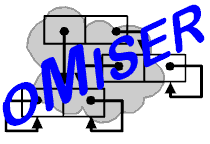
Numbering
Peano
Background Resources
A040601B>
2004-06-06
-17:13 -0700

|
Numbering
Peano |
|
These are background clippings and notes relevant to the Numbering Peano discussion project.
Status |
Date |
NOTE |
| blog | 2004-06-06 | What Is a Model? Comments on Hal Pierson's essay, which also wonders about modeling the problem space instead of the solution space. |
| blog | 2004-06-05 | A Fine Kettle of Fish. Orcmid takes a walk through MDA, Java Interfaces, and Num.java just enough to set the stage for an appreciation of the problem. This gives context to one view that we want to clarify with this exercise. |
| blog | 2004-06-05 | Numbering Peano: Annotated. Orcmid sets the groundrules and the structure for the conversation on |
| blog | 2004-06-01 | Annotating Peano Numbers. The initial place-holder created along with the establishment of Blog Numbering Peano. |
| note | 2004-05-28 | Ward Cunningham - Revolution in Communication. This is where Dennis got wikis and blogs as communal articulation of what matters. This goes along with coming to grips with concepts that are so elusive "that we have to practice saying it to find a way to articulate what matters." |
| note | 2004-05-26 | Where Do Integration Agreements Live. This raises the question of where meaning arises for interfaces, and where there are invitations for misunderstanding. Here Dennis declares anderbill's and his having "taken our exploration of the syntax, semantics, and 'what is coded where' out of sight until we have the crude initial exploration out of the way." That is in reference to this place here. Dennis mentions the provocative comment and where we had started discussion. |
|
Initial Discussion and Provisional Ideas The trial-and-error stage by which we start to see the opportunities to talk about abstraction and provide a concrete, worked example that can be used to demonstration what computer language syntax and semantics are about and where meaning and situated use arise |
||
| e-mail annotated 2004-06-04 |
2004-05-23 | Assuming Contexts and Meanings. Bill responds to a number of comments and we are left to figure out what is next and how do we wrestle all of this to the ground. |
| e-mail annotated 2004-06-03 |
2004-05-22 | Delighted response. Dennis sees how Bill induced that int type was a good choice, and uses that as a great contextual assumption. An alternative interface is proposed that holds onto the idea of Peano Numerals always being encapsulated behind interfaces. |
| e-mail annotated 2004-06-03 |
2004-05-22 | Seems like the simplest thing. Bill comes up with an interface that compiles, with a surprise for Dennis. |
| 2004-05-22 | Wait 'til the interface compiles. Bill acknowledges my letting him know about the addendum about the example and we sort of pull back to collect ourselves and see what's next. | |
| 2004-05-22 | boolean not Boolean. In notifying Bill about my latest comment, I notice an error and add that "question 0 is how much of this is understood already, without any more information, and what is the basis for that?" | |
| comment annotated 2004-06-03 |
2004-05-22 | I have in mind an example ... .This is where I write some broken code and add some comments that I think are important, followed by an addendum of supplementary comments. This is the basis for the example kick-off note on Numbering Peano. |
| comment | 2004-05-21 | Provocative Comment. This is where Bill responds with "I totally agree that syntax by itself isn't enough for contracts. So I think the semantics are crucial, but in API's, as with ordinary language, the semantics are loaded onto the words and symbols and syntax. The work of establishing meaning needs to be addressed. [dh: my emphasis]" |
| 2004-05-21 | Analogy with Interface Contracts. I let Bill know I have responded to him, and add a comment by email: "I am thinking in terms of interface contracts. The contracts have to have something more than syntax. I don't know where that is established, but it is required for everything to work, yes?" | |
| comment | 2004-05-21 | Running Down My Own Bunt. "There's something about having API's be only about syntax that doesn't work. I don't see how there is any assurance of interoperability if API's are entirely syntactic. What am I missing?" orcmid asks. |
| comment | 2004-05-21 | Right On! This is where Bill points the way with his comment, "Right on! And this reminds me of recent conversations regarding models, abstractions, and meaning. Sometimes, in math and in programming, meaning is in the syntax. For interoperability then the API's need to be only about syntax. Meaning is inside the payload, not the protocol." I am baffled about how he means that API's need to be only about syntax. There are two things here: The question about APIs and syntax versus semantics, and the recent conversations. The second needs to be knitted in, and there is room for extension in that direction toward the requirements gap, confirmable experience, and coherent fostering of user conceptual models |
| blog | 2004-05-20 | MDA Article: Couple of Misunderstandings. This is where I comment on a discontinuity that I ran into in discussion of Model-Driven Architecture's separation of Platform Independent Models and Platform Dependent Models, with someone wondering why the problem isn't solved already by simply using the Java API, which was apparently thought to be Platform Independent. I said "There is an interesting discussion about logical/functional and the so-called platform-independence of Java. I like the juxtaposition of the two messages here because it points out one of the problems we have with modeling and programming being done by the same people." There is more here about levels of abstraction and the risk of interpreting all problems as programming problems when that is the level one is swimming in. There are also questions about necessary stages of development in becoming a software designer, engineer, or architect. But the key think here is that I saw a mistake in thinking that the Java API was platform independent in the sense that MDA concerns itself with platform-independent models. I said "perhaps it is simply that when what you know is programming, everything is interpreted as a programming problem. It would be great to jar people's thinking about that." This discussion and its use of Java by way of illustration is meant to address that second part. |
| [fill in below here with older material that is tied into this] | ||
| blog | 2004-05-12 |
Document-Centric
Interface Contracts? What?? Eric Gropp suggests that
the principle of contracted interfaces can be extended by using XML to
carry material through interfaces, but I am not clear on what the
extension is. Eric provides more context and acknowledges that he
is "still looking for that single all-persuasive paragraph about
interface contracts." |

|
You are navigating the Miser Project. |
created 2004-06-03-12:52 -0700 (pdt) by orcmid |